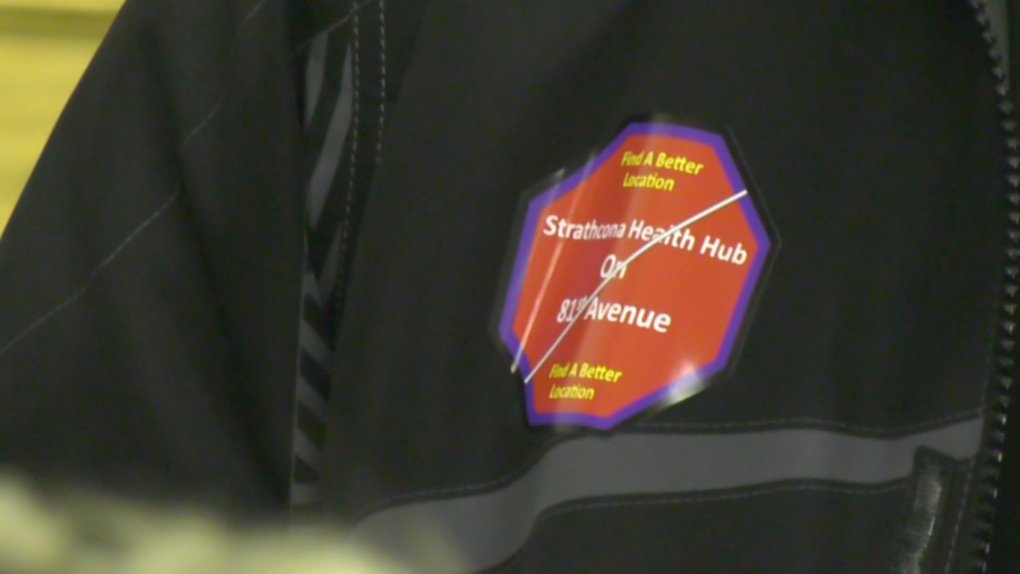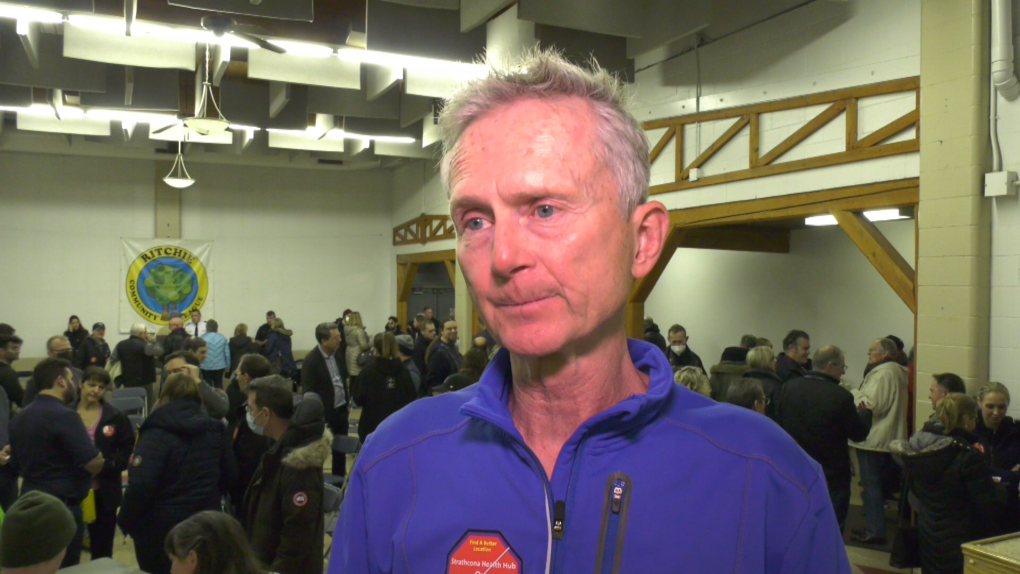Ritchie, Strathcona residents express frustration over public consultation process for south-side 'health hub'
Boyle Street Community Services has acknowledged it has a lot of trust-building to do around Edmonton's first potential overdose prevention services south of the river.
The Ritchie Community League Hall was packed by 6 p.m. for Boyle Street's second town hall on Monday.
Many of those in attendance wore stop sign-shaped stickers that read: "Find a better location."
Boyle Street Community Services (BSCS) brought in police, fire and health officials to help answer questions from community members. The agency also prepared a slideshow presentation with information about how the "microsite" at 81 Avenue and 101 Street would operate.
Originally, the social agency planned to station its workers and the police, fire and health officials around the room for one-on-one questions. But early in the meeting, at the announcement there wouldn't be an open floor for questions, some in the crowd began to boo.
"No. No. We want to be heard. We want to have a voice," one woman yelled. Cries of "bait and switch" and "keep it public" followed.
"Guys, there's lots of us here in opposition. Let's be respectful," another attendee said.
At other points in the evening, audience members accused the Boyle Street team of shutting down and disempowering the community.
"It's already a foregone conclusion when they decided to sign the lease without consulting the community," Sherri McKnight told CTV News Edmonton after the meeting ended.
- Many Ritchie businesses and residents 'feeling conflicted' about new Boyle Street health hub
- Ritchie zoning hearing dominated by community concerns surrounding new Boyle Street health hub
BSCS already has a lease for the 81 Avenue building but is in the process of obtaining the proper licencing and illegal-drug exemptions to operate three overdose prevention booths, which requires the provincial government's approval.
In response to criticism that public consultation did not start out broad enough, Boyle Street's Elliott Tanti acknowledged, "I, ultimately, am the head of engagement for our organization and that was a mistake."
Eventually, moderator Michael Walters – the former city councillor – announced questions could be asked on a one-on-one basis in another room and the main floor would be opened to questions.
"We're doing our best," he said when opponents started to yell again.
"You're not doing very well," a man in the crowd retorted.
"You're controlling the agenda 100 per cent," a woman added.
Walters replied: "We're gonna be at eight o'clock before anyone asks a question."
- Proposed health-care hub with overdose prevention site to be Edmonton's first ever south of the river
- Mixed reviews come in for Boyle Street's proposed Strathcona health-care hub
THE QUESTIONS
Out of the building on 81 Avenue, BSCS will also offer housing, recovery and addiction help, and limited in-patient medical care.
As organizers said on Monday, the facility would be open from 8 a.m. to 10 p.m. At least six workers – including a nurse, social worker, and security – would be on site at all times. Housing outreach workers, mental health counsellors, clean-up crews and cultural support workers would also visit the site throughout the week.
An estimated 15 to 30 people would be moved through the site each day.
"What's the observation plan in place after people use [drugs] to prevent psychosis on the street?" one community member asked.
"We do ask them to stay – and they generally do stay – for at least 15 minutes," Tanti replied. "That's sort of a minimum requirement. Generally, in our experience operating supervised consumption sites, the people stay much longer and in fact, we actually have to ask people to leave so we can continue people through the site because it's a place where they feel safe."
 Some attendees at the town hall wore stickers saying, 'Find a better location,' and line through 'Strathcona Health Hub on 81 Avenue' (CTV News Edmonton/Sean McClune).
Some attendees at the town hall wore stickers saying, 'Find a better location,' and line through 'Strathcona Health Hub on 81 Avenue' (CTV News Edmonton/Sean McClune).
He told the crowd a lack of food, sleep and a sense of safety all contribute to frantic behaviour after drug use, and are all things the microsite would help its clients find.
"When you create a safe place for people to use, the behaviour people exhibit completely changes. We see it all the time in the people we serve," Tanti said.
- More than 1,400 Albertans died from drug-poisoning deaths in 2022: provincial data
- Is Alberta's approach to addiction truly behind the declining number of drug-poisoning deaths?
Another audience member asked what recourse the community had if the facility had negative impacts on the neighbourhood. According to Tanti, the facility would be subject to a six-month probationary period upon opening. Its licence would be up for renewal each year and could be revoked at any time, too, he said. BSCS would regularly report to the provincial government about its operations and community impact.
He also fielded questions about the difference between the proposed facility and Edmonton's other social services, what local crime data could be made available to the public, and what security measures would be put in place to protect customers of neighbouring businesses.
"I guess I'm having a bit of an identity crisis because I believe so much in harm reduction, but I'm also coming as a parent," admitted a registered nurse and mother of two young children. "I feel concerned about my usage pattern but highly protective of my little kids, and too, because I want to foster positive engagement with people who are different than us, and I wonder if this is going to hinder that more than it helps it."
"Thank you. I hear the tension in your voice," Tanti noted before explaining BSCS plans to contract professional security resources and also provides specialized training.
"Maybe that means at three o'clock, when we know lots of parents are coming to pick up kids, those people are out in the community?" he suggested.
A business owner asked, "If this goes forward, would you be open to training my staff about the de-escalation and naloxone?"
"Absolutely," Tanti replied.
- 36 beds opening in Edmonton for homeless people recently discharged from ER
- Feds announce program to fight opioid poisoning in Edmonton
"Who are these people who are using the site? I want to hear a discussion about the humanity of these people, like what kind of demographics and what kind of situations are they coming from," another person asked.
He continued: "The thing is they're already there. I don't think there's a lot of recognition in this discussion of the humanity of those people. Their lives matter."
'WHERE THE SERVICES ARE NEEDED'
The question-and-answer period lasted more than 90 minutes.
"I think it was a very robust, if not animated and heated, discussion," commented Rob Bligh, one of the original members of the group Scona Concerned Citizens.
"Some of the answers about how they would operate the site, the purpose of the site, I think they were very good. It doesn't address the issue of why put it in a location that's as vibrant and robust as what they've chosen, and the damage that it will cause."
 Rob Bligh speaks with CTV News Edmonton after the Monday evening town hall (CTV News Edmonton/Sean McClune).
Rob Bligh speaks with CTV News Edmonton after the Monday evening town hall (CTV News Edmonton/Sean McClune).
He asked Tanti that question during the public forum and was told BSCS looked at overdose data, consulted other service providers, and talked to land and property owners before picking a location.
By Bligh's math, with a 500-metre radius of the address, there are three daycares with 220 licenced spaces for children, nine family activity centres, some 2,000 residents and 400 businesses.
"I heard a lot of your description of why this is good for people that have addictions and why this helps the people that are in need of that kind of help. What I didn't hear in there was any consideration for the affected neighbourhood… That's not part of your decision criteria," Bligh told Tanti.
"No, it's not," Tanti replied.
"How could it not be?" Bligh asked.
"It's because it's where the services are needed," Tanti told him.
- Edmonton opioid-related EMS calls increase 299% since 2018
- 'Death trap': Front-line workers warn of drug overdoses rising on and off the streets
After the meeting, a Ritchie resident of 20 years and Bear Clan volunteer told CTV News Edmonton she feared the community did not understand how the overdose prevention site would benefit residents.
"I think there's a lot of misunderstanding that having this site present will cause an influx of unhoused people or criminals into our area, but the way I see it there's already issues with homelessness and addictions and mental health challenges in our community," Carolyn Belanger said. "By having this site available to people, it will act as a hub so people can come and find security and safety and also connect with resources they might not otherwise have access to."
For the second day in a row, Ward papastew Coun. Michael Janz on Tuesday declined to comment on the debate going on in Ritchie and Strathcona, calling it a provincial matter.
Mayor Amarjeet Sohi wouldn't comment specifically on the 81 Avenue site, but called harm reduction strategies and safe supply necessary in tackling the drug crisis.
"I hope that Edmontonians embrace a compassionate approach to helping Edmontonians get better," he told reporters at city hall.
With files from CTV News Edmonton's Sean McClune and Adam Lachacz
CTVNews.ca Top Stories

Quebec man, 81, gets prison sentence after admitting to killing wife with Alzheimer's disease
An 81-year-old Quebec man has been sentenced to prison after admitting to killing his wife with Alzheimer's disease.
Canada Post quarterly loss tops $300M as strike hits second week -- and rivals step in
Canada Post saw hundreds of millions of dollars drain out of its coffers last quarter, due largely to its dwindling share of the parcels market, while an ongoing strike continues to batter its bottom line.
'Immoral depravity': Two men convicted in case of frozen migrant family in Manitoba
A jury has found two men guilty on human smuggling charges in a case where a family from India froze to death in Manitoba while trying to walk across the Canada-U.S. border.
Prime Minister Trudeau attends Taylor Swift's Eras Tour in Toronto with family
Prime Minister Justin Trudeau is a Swiftie. His office confirmed to CTV News Toronto that he and members of his family are attending the penultimate show of Taylor Swift's 'The Eras Tour' in Toronto on Friday evening.
Trump supporters review-bomb B.C. floral shop by accident
A small business owner from B.C.'s Fraser Valley is speaking out after being review-bombed by confused supporters of U.S. president-elect Donald Trump this week.
Pat King found guilty of mischief for role in 'Freedom Convoy'
Pat King, one of the most prominent figures of the 2022 'Freedom Convoy' in Ottawa, has been found guilty on five counts including mischief and disobeying a court order.
Nearly 46,000 electric vehicles recalled in Canada over power loss risk
Nearly 46,000 electric vehicles from Kia, Hyundai and Genesis are being recalled in Canada over a potential power loss issue that can increase the risk of a crash.
Trump chooses Bessent to be Treasury secretary and Vought as top budget official
President-elect Donald Trump announced Friday that he'll nominate hedge fund manager Scott Bessent, an advocate for deficit reduction, to serve as his next treasury secretary. Trump also said he would nominate Russel Vought to lead the Office of Management and Budget.
Canada's tax relief plan: Who gets a cheque?
The Canadian government has unveiled its plans for a sweeping GST/HST pause on select items during the holiday period. The day after the announcement, questions remain on how the whole thing will work.


































